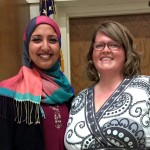It was around a Panera table that I realized that I needed to pursue ministry. We were sitting around the table, sharing our stories, our lives, our beliefs and doubts discussing national and global events, how our faith shapes our worlds, and how our wounds, particularly our religious scars, make us better people. We met once a week to have a meal and a conversation, but this was about the only thing we had in common. This table in Panera, just outside of Nashville, was where an agnostic Muslim, a practicing Daoist, a few non-religious folks, an atheist, a secular humanist, and a handful of Christians became my community; the unlikely community that helped me discern my call.
Around this table I experienced the good in humanity; we regaled each other with beautiful, and occasionally horrific, stories of our faith communities as we tried to figure out how to live life and be people of faith and integrity. Around this table I saw vulnerability and openness that was tender and inspiring, and I laughed at stories that were comical and too bizarre to be made up. And around this table I first came to fully know the rewards and challenges of interfaith dialogue as I was beginning to shape my ministerial identity.
While some of the challenges are obvious, occasionally they are quite subtle. Generally, we define and understand God differently, religious garb seems unfamiliar and perhaps unnecessary, and we have a different religious vocabulary and often different cultures, but to let these overt differences be the sole focus of our understanding of interfaith dialogue is to see it dimly, through a glass.
Around this table, with these people, I learned what it looks (and feels) like to firmly hold a belief in conversation with someone who firmly holds an opposing belief. This, especially in our social climate today, is incredibly invaluable. The skill of being able to not only articulate what you think and believe and why, but also to hold a real conversation with someone who doesn’t automatically agree with you because of the shape of your religious necklace is sharpened through interfaith dialogue.
Interfaith dialogue is important to me and to my call not simply because I like people and diversity, but because it makes me a better Christian minister. It teaches me compassion and grace; it teaches me what aspects of my faith are central to who I am as a Christian, which aspects are central to the institution of the Christian religion, and which are matters of opinion and tradition. Interfaith dialogue teaches me conflict resolution in some very real and concrete ways. It teaches to me to see people and stories first, labels and dogmas second.
 Here in this photo, I am with my friend Manel, who also serves with me on the Abilene Interfaith Council Board. Manel, along with many others in my work with the Abilene Interfaith Council, has taught me so much about being gracious in the face prejudice. Through hearing her story, I learned that she was inspired to start wearing her hijab by seeing the faith of Christians in our community, and I’ve been reminded that, in this largely Christian nation I will rarely, if ever, be treated the way she does for faithfully living out her beliefs and moral convictions. Truly, I have seen the embodiment of kenosis because of my friendship and partnership with her in our challenging work of pursuing interfaith dialogue.
Here in this photo, I am with my friend Manel, who also serves with me on the Abilene Interfaith Council Board. Manel, along with many others in my work with the Abilene Interfaith Council, has taught me so much about being gracious in the face prejudice. Through hearing her story, I learned that she was inspired to start wearing her hijab by seeing the faith of Christians in our community, and I’ve been reminded that, in this largely Christian nation I will rarely, if ever, be treated the way she does for faithfully living out her beliefs and moral convictions. Truly, I have seen the embodiment of kenosis because of my friendship and partnership with her in our challenging work of pursuing interfaith dialogue.
There have been many things that have, and will continue to, shape my formation both as a Christian and as a minister, everything from the flannel graph VBS lessons to the friends and family who fostered in me a discerning and inquiring heart. The one that stands out, though, as I’m on the cusp of beginning my life’s work, is how I have been shaped by those who look and act differently than me and all the lessons that we have learned from each other as we seek the betterment of our community while being continually shaped by our differences.
Becca Kello is a third year M.Div. student and is serving as the President of the Abilene Interfaith Council.
